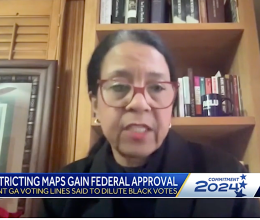
Well Georgia, we’ve made it through two whole weeks of official legislative days, and the quick pace of the session continues. This week, we spotted a troubling trend with the introduction of more bills with tough on crime stances that added extended punishments and would largely impact already vulnerable communities.
So far, two of those bills have stalled in committee for second looks. You can closely follow bills in our new tracker, Fast Democracy. Track bills and set alerts for things like committee meetings and votes.
ACLU of Georgia First Amendment Policy Advocate Sarah Hunt-Blackwell testified before the Senate Judiciary Committee on Monday in opposition to Senate Bill 392. It restricts social media users from uploading deceptive “deep fake” content about candidates up to 90 days before an election and creates a new criminal offense of election interference with a deep fake. It’s hard to believe, but lawmakers proposed the offense carry a felony punishment of up to five years in prison.
SB 392 was tabled following Hunt-Blackwell’s and others’ testimony. Several days later, another version of the bill, HB 986, emerged in the Georgia House Technology and Infrastructure Committee. It stalled after debate among legislators. We believe constitutionally-required protections on political speech must be included in any version of these bills before passage. At least two states have passed similar laws that address election interference concerns and avoid overcriminalization.
We kept a watchful eye on Senate Bill 63, which dramatically increases the number of low-level offenses people will be forced to post cash bail for to be released before trial. This bill would slow down the release process for misdemeanors and increase the populations of already overcrowded jails. It disproportionately affects underserved communities and people with low incomes who often can’t afford bail. The bill passed the Senate in a 30-17 vote on Thursday and now moves to the House for consideration. Georgians should contact lawmakers and tell them to vote “No.”
As for Senate Bill 415, we’re in support. It allows cities or counties to equip police vehicles with tech that shows if a car has current insurance and registration. If not, a citation would automatically be sent in the mail. “Moving toward civil penalties for these minor offenses, I think it actually makes us safer. It makes interactions with police safer,” ACLU of Georgia Deputy Director of Policy & Advocacy Fallon McClure told 11 Alive.
Follow us on FaceBook, Instagram, and Threads for more updates. And see you Tuesday, when the session resumes.

